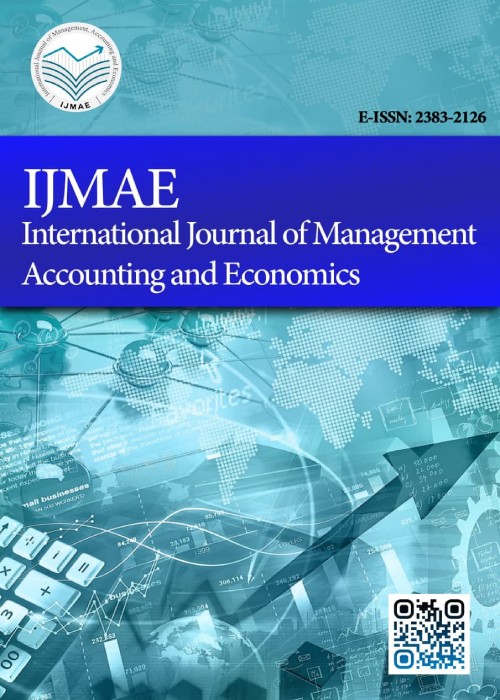فهرست مطالب
International Journal of Management, Accounting and Economics
Volume:9 Issue: 12, Dec 2022
- تاریخ انتشار: 1401/11/26
- تعداد عناوین: 4
-
Pages 764-781It is conceivable to question why highly educated and competent workers are permitted to leave their employment. The determination of this paper is to identify the important issues prompting worker retaining in the northern Bangladesh NGO sector and to examine how staff retention impacts on logistic performance. Some of the things that are looked at in this study as retention drivers are economic stability, psychological security, connections with coworkers, and self-actualization. With a simple random sampling method and a questionnaire, the employees are polled to get the important information. We selected Rajshahi, Bogra, Natore, and Kushtia as well as four NGOs from each district for the random sample. Each NGO conducted ten worker interviews for data collection. The total number of samples is 160. SEM-SPLS examines data, evaluates the research model and hypotheses, and tests the study model and hypotheses. There are economic, psychological, interpersonal, and self-actualization aspects of employee retention. The paper covers the hypothetical and applied ramifications of the inquiry.Keywords: Employee Retention, NGO, organizational performance, Bangladesh
-
Pages 782-805In emerging nations like Ghana, unemployment has grown to be a serious worry for graduates. According to this perspective, the majority of graduates are recommended to start their own businesses rather than wait for positions from the government. This paper aims to examine the entrepreneurial intentions among University students, using variables such as Motivation, Family Background, Entrepreneurship Education and External Factors. This is a cross-sectional study where the results were based on the outcomes of a survey among the University of Cape Coast, school of Business students (n=130). Inferential statistical procedures such as the Pearson Product-Moment correlation test, Multiple Regression and Stepwise Regression Analysis were used to assess the study's specific aims and tested the four main hypotheses. The results indicated that all variables but Family Background positively influence students’ entrepreneurial intentions and that Motivation is statistically significant in analyzing the factors that significantly affect the students’ entrepreneurial intentions. Hence, more emphasis should be based on motivating the students both within and outside to enable them develop entrepreneurial mindsets. The study suggests that policymakers should focus on encouraging student entrepreneurship as it will be a proper management to deal with the severe unemployment issue in emerging countries, especially Ghana.Keywords: Entrepreneurship, Entrepreneurial intention, Business Students
-
Pages 806-820This study examines the relationship between Audit Committee Attributes and Changes in Financial Reporting Quality Among Manufacturing Firms in Kenya. Using a sample of publicly listed firms based on 2010-2018 data, our study finds that the expertise of the Audit Committee has an insignificant positive impact on the financial reporting quality of financial reports, measured by accrual quality. Audit committee size and financial reporting quality show mixed findings for two measures of financial reporting quality. The results show a positive, statistically significant effect between the size of the audit committee and discretionary accruals. On the contrary, the size of the audit committee shows a statistically positive insignificant relationship with accruals quality. Audit committee independence has a statistically significant effect on both accruals' quality and discretionary accruals as measures of financial reporting quality. Finally, audit committee meetings on the financial reporting quality show a negative nonsignificant relationship between audit committee meetings on both accruals' quality and discretionary accruals. The results of this research may be of interest for policymakers who have the authority over the appointment of audit committee members to choose independent and expert individuals, for regulators to reconsider their rules and mandate concerning corporations and their corporate governance structure.Keywords: Audit committee Expertise, accruals quality, Audit Committee Independence, Financial Reporting Quality, Discretionary accruals, Audit committee meetings
-
Pages 821-846The main objective of this study was to empirically examine the influence of globalization on income inequality in Nigeria from 1986 to 2021. The income inequality was represented by the Gini coefficient while globalization was measured by key indices like foreign direct investment, remittances, and trade openness. With the use of the autoregressive distributed lag (ARDL) approach which was as a result of the stationary of our series at levels and first difference as reported by the Augmented Dickey-Fuller unit root test, the study observed that a long-run relationship exists amid inequality and measures of globalization. In the short-run, it was realized that foreign direct investment, remittances, trade openness, and urbanization aided in reducing income inequality in the short-run while inflation accelerated income inequality within the study period. In the long-run, the only measure of globalization that significantly reduce income inequality is remittances; while foreign direct investment significantly increased income inequality in the long-run. the paper concluded that it is not inevitable that measures of globalization have different influence on inequality of income and wealth depending on time.Keywords: inequality, Poverty, globalization, International Trade, Gini coefficient


